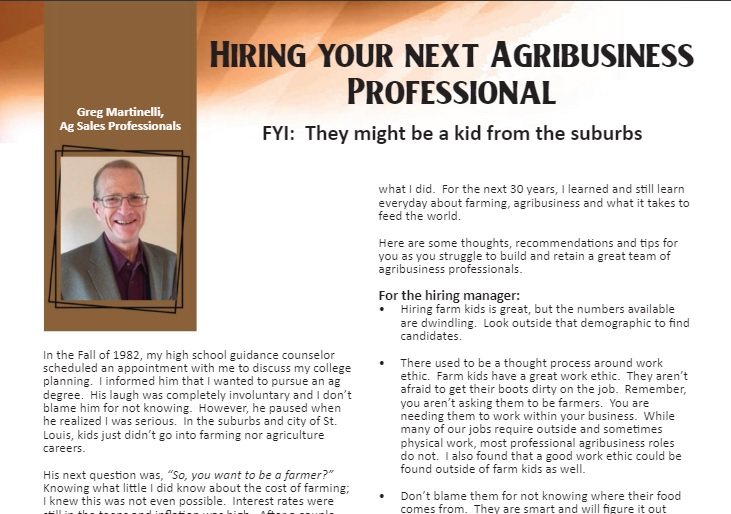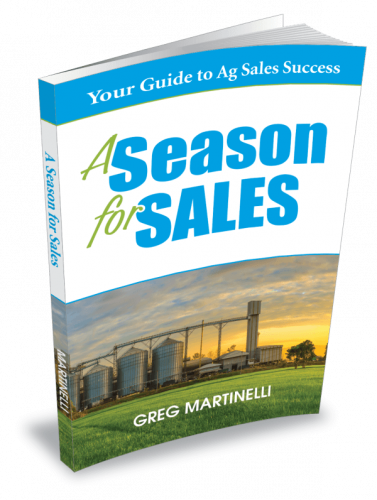FYI: It might be a kid from the suburbs
Originally published in the Wisconsin Agribusiness Assoc Quarterly: https://issuu.com/joanviney/docs/22_summerlo/30
In the Fall of 1982, my high school guidance counselor scheduled an appointment with me to discuss my college planning. I informed him that I wanted to pursue an Ag degree. His laugh was completely involuntary and I don’t blame him for not knowing. However, he paused when he realized I was serious. In the suburbs and city of St. Louis, kids just didn’t go into farming or agriculture careers.
His next question was, “So, you want to be a farmer?” Knowing what little I did know about the cost of farming; I knew this was not even possible. Interest rates were still in the teens and inflation was high. After a couple of weeks of researching, he told me the only options he found were either being a farmer or being a county agent. And county agent pay was fairly low.
I share this story as it illustrates the difficulty of hiring non-farm kids in our industry. We know the number of farmers is dwindling. At last count, I believe the number was less than 1% of our population. That means the number of farm kids is dwindling. Your hiring pool is slowly draining. To add difficulty to this scenario, it’s estimated that 200,000 agribusiness professionals retire every year. While the colleges are only graduating around 30,000 per year.
What to do? Consider looking outside the agribusiness field. Consider looking at a city kid.
After graduating from The University of Missouri, I spent five years in the Army and lost almost any connection to the Ag world. During interviews, I heard the same response from most companies. “We really like your leadership skills, but you have no Ag background. We want to hire you but just don’t know where to put you.” These felt like strange compliments. One very forward-thinking company had a program that was a perfect fit. Their offer came quickly and without a lot of discussion on my background. A business manager training program required a lot of leadership skills, while the farming knowledge could be learned along the way. And that’s what I did. For the next 30 years, I learned and still learn every day about farming, agribusiness, and what it takes to feed the world.
Here are some thoughts, recommendations, and tips for you as you struggle to build and retain a great team of agribusiness professionals.
For the hiring manager:
- Hiring farm kids is great, but the numbers available are dwindling. Look outside that demographic to find candidates.
- There used to be a thought process around work ethic. Farm kids have a great work ethic. They aren’t afraid to get their boots dirty on the job. Remember, you aren’t asking them to be farmers. You are needing them to work within your business. While many of our jobs require outside and sometimes physical work, most professional agribusiness roles do not. I also found that a good work ethic could be found outside of farm kids as well.
- Don’t blame them for not knowing where their food comes from. They are smart and will figure it out pretty fast once they are hired. They grew up in a world of busses, subways, and neighborhoods with several grocery stores within a one-mile radius. That’s where their food came from.
- Internships are one of the greatest recruiting tools you can implement. It allows you and them to dip a toe in the water. It is far less costly to hire an intern for 90 days than to hire a permanent employee who doesn’t stay. Many candidates we interviewed would accept a job offer, only to find out four months into it, that they don’t like it. There were a variety of reasons: didn’t like the location, didn’t like the type of work or work environment, etc. Likewise, we hired a lot of interns who interviewed wonderfully but someone else showed up for the job.
- Last thought regarding the desire to hire farm kids. I realize that a farm kid has a built-in passion for the end-user: the farmer. They grew up in it and their entire family is involved in it. I have also seen many non-farm kids come into this business and develop that same passion. The desire to learn and develop themselves is more important than any background.
For the Hiring Candidate:
- Agribusiness is never going away. I always say never say never. But I am fairly confident, everyone will always need to eat. And everyone is the 7-8-9 billion people on the planet. I left the Army in the middle of an economic downturn with unemployment at a high rate. My family thought I was making a big mistake. However, in the agribusiness world, jobs were plenty. Growth was constant and still is. It doesn’t always look the same or require the same number of people. But if you are flexible in your approach to your career, there is a lifetime of growth.
- Not all jobs are outside in the dirt and manure. Some are; if that’s where you aspire to be. However, there is everything from corporate offices in major cities, to pristine research labs, to manufacturing plants, to distribution centers, to office environments of all shapes, sizes, and locations. This means you can pretty much work anywhere you like. Agribusiness allows good compensation opportunities in rural areas that might not have other industries.
- A lot of opportunities, even during a tough economy. Let’s go back to the comment from my guidance counselor, “All I found was either being a farmer or being an extension agent”. Again, I don’t blame him for not knowing that there are hundreds of thousands of companies in agribusiness. Many are located right in St. Louis where we were at the time. People not involved don’t know. So, tap into some associations, and some college recruiting offices to find out how much Ag is right in your hometown.
- You get a lot of opportunities early in your career. Agribusiness is mostly spread out geographically due to customer distribution. This means more and smaller business offices spread out over the country. That requires more location managers, operation managers, and sales managers. Within months of starting, I was in charge of spending hundreds of thousands of dollars for ingredients to keep seven feed mills running. Throughout my career, I was always amazed at the opportunity to make fairly big decisions without a lot of training and very early in my development.
- Never make an excuse for not growing up on a farm: In my early selling days, I referred to a couple of summers I spent on my cousin’s dairy farm. I really tried to portray that I had some vague farming experience. It is true and that is how I got interested in the business. However, I quickly stopped referring to it. Instead, I owned up to my inexperience. I wasn’t afraid to let customers know I grew up in the city and didn’t learn Ag until I was hired by my company. This actually opened the doors for me to ask a lot of questions. These questions led to a much better selling experience than if I acted like I knew what they were talking about.
Realizing and understanding all of this is the first step toward building your team. The next step is letting candidates know about it. Please don’t misunderstand, I think we still need to recruit heavily at the agribusiness schools. They are great and have great candidates graduating from them. The struggle is sheer numbers. There’s not enough of them. So, how do we let the world know about our industry?
What does an agribusiness do right now, this month to begin recruiting outside of Ag?
- Word of Mouth: as with any industry, word of mouth is some of the best advertising you can have. Many of the best people hired came from connections to current employees. Actively engage with your current employees to look at their connections for a fit within your organization.
- Social Media: of course, social media is involved in almost all of our plans for anything today. Hiring is no different. The value is that you can blend traditional recruiting ads with content-style media. Pure ads are important, but most often are regarded as exactly what they are- ads. What else is the company going to say about working for them? However, with some current employee interviews and longer-form content, potential candidates will see proof of your recruiting campaign.
- Hiring Agencies: They spend every day talking with both employees and employers about the job market. They can help you find recruits before they are on the open job market. Those that work in both the agribusiness and the food sector can help search just a little past where Ag ends and food begins.
Finding, building, and retaining a talented team of agribusiness professionals has never been as difficult as it is now. While HR leads the process and administration of hiring candidates, it really needs to be an ongoing strategy for everyone to continuously look for good people to join the company.


